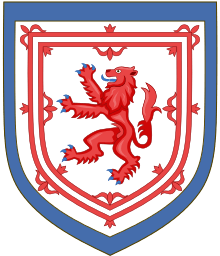Marquess of Zetland
| Marquessate of Zetland | |
|---|---|
|
Argent, a lion rampant within a double tressure flory counterflory gules, all within a bordure azure[1] | |
| Creation date | 22 August 1892 |
| Monarch | Queen Victoria |
| Peerage | Peerage of the United Kingdom |
| First holder | Lawrence Dundas, 3rd Earl of Zetland |
| Present holder | Lawrence Mark Dundas, 4th Marquess |
| Heir apparent | Robin Lawrence Dundas, Earl of Ronaldshay |
| Remainder to | the 1st Marquess's heirs male of the body lawfully begotten |
| Subsidiary titles | Baron Dundas; Earl of Zetland; Earl of Ronaldshay |
| Seat(s) | Aske Hall |
| Armorial motto | Essayez ("Try")[1] |
Marquess of Zetland is a title in the Peerage of the United Kingdom. It was created on 22 August 1892 for the former Lord Lieutenant of Ireland, Lawrence Dundas, 3rd Earl of Zetland. Zetland is an archaic spelling of Shetland. The Dundas family descends from the wealthy Scottish businessman and Member of Parliament, Lawrence Dundas. In 1762 he was created a Baronet, of Kerse in the County of Linlithgow, in the Baronetage of Great Britain. The title was created with remainder, failing heirs male of his own, to his brother Thomas Dundas and the heirs male of his body. He was succeeded by his son, the second Baronet. He represented Richmond and Stirling in the House of Commons and also served as Lord Lieutenant of Orkney and Shetland. In 1794 he was created Baron Dundas, of Aske in the County of York, in the Peerage of Great Britain. Lord Dundas notably purchased the right to the earldom of Orkney and lordship of Zetland from James Douglas, 14th Earl of Morton.
His son, the second Baron, was a Member of Parliament for Richmond and also served as Lord Lieutenant of Orkney and Shetland. In 1838 he was created Earl of Zetland in the Peerage of the United Kingdom. He was succeeded by his eldest son, the second Earl. He also represented Richmond and York in Parliament and served as Lord Lieutenant of the North Riding of Yorkshire. On his death the titles passed to his nephew, the third Earl. At first a Liberal, he held minor office in the second administration of William Ewart Gladstone but later joined the Conservative Party and served from 1889 to 1892 as Lord Lieutenant of Ireland. The latter year he was honoured when he was made Earl of Ronaldshay, in the County of Orkney and Zetland, and Marquess of Zetland. The earldom of Ronaldshay is the courtesy title of the eldest son and heir of the Marquess. He was succeeded by his son, the second Marquess. He was also a prominent politician and served as Governor of Bengal and as Secretary of State for India. As of 2016 the titles are held by his grandson, the fourth Marquess, who succeeded his father in 1989.
The family seat is Aske Hall, Richmond, North Yorkshire.
Dundas Baronets, of Kerse (1762)
- Sir Lawrence Dundas, 1st Baronet (1710–1781)
- Sir Thomas Dundas, 2nd Baronet (1741–1820) (created Baron Dundas in 1794)
Barons Dundas (1794)
- Thomas Dundas, 1st Baron Dundas (1741–1820)
- Lawrence Dundas, 2nd Baron Dundas (1766–1839) (created Earl of Zetland in 1838)
Earls of Zetland (1838)
- Lawrence Dundas, 1st Earl of Zetland (1766–1839)
- Thomas Dundas, 2nd Earl of Zetland (1795–1873)
- Lawrence Dundas, 3rd Earl of Zetland (1844–1929) (created Marquess of Zetland in 1892)
Marquesses of Zetland (1892)
- Lawrence Dundas, 1st Marquess of Zetland (1844–1929)
- Lawrence John Lumley Dundas, 2nd Marquess of Zetland (1876–1961)
- Lawrence Aldred Mervyn Dundas, 3rd Marquess of Zetland (1908–1989)
- Lawrence Mark Dundas, 4th Marquess of Zetland (b. 1937)
The heir apparent is the present holder's eldest son Robin Lawrence Dundas, Earl of Ronaldshay (b. 1965).
The heir apparent's heir presumptive is his brother Lord James Edward Dundas (b. 1967).
The heir apparent's heir presumptive's heir apparent is his son Milo James Dundas (b. 1998).
References
- 1 2 Fox-Davies, Arthur Charles (1895). Armorial Families: A Complete Peerage, Baronetage, and Knightage. p. 1071. Retrieved 15 July 2016.
- Kidd, Charles, Williamson, David (editors). Debrett's Peerage and Baronetage (1990 edition). New York: St Martin's Press, 1990.
- Leigh Rayment's Peerage Pages

